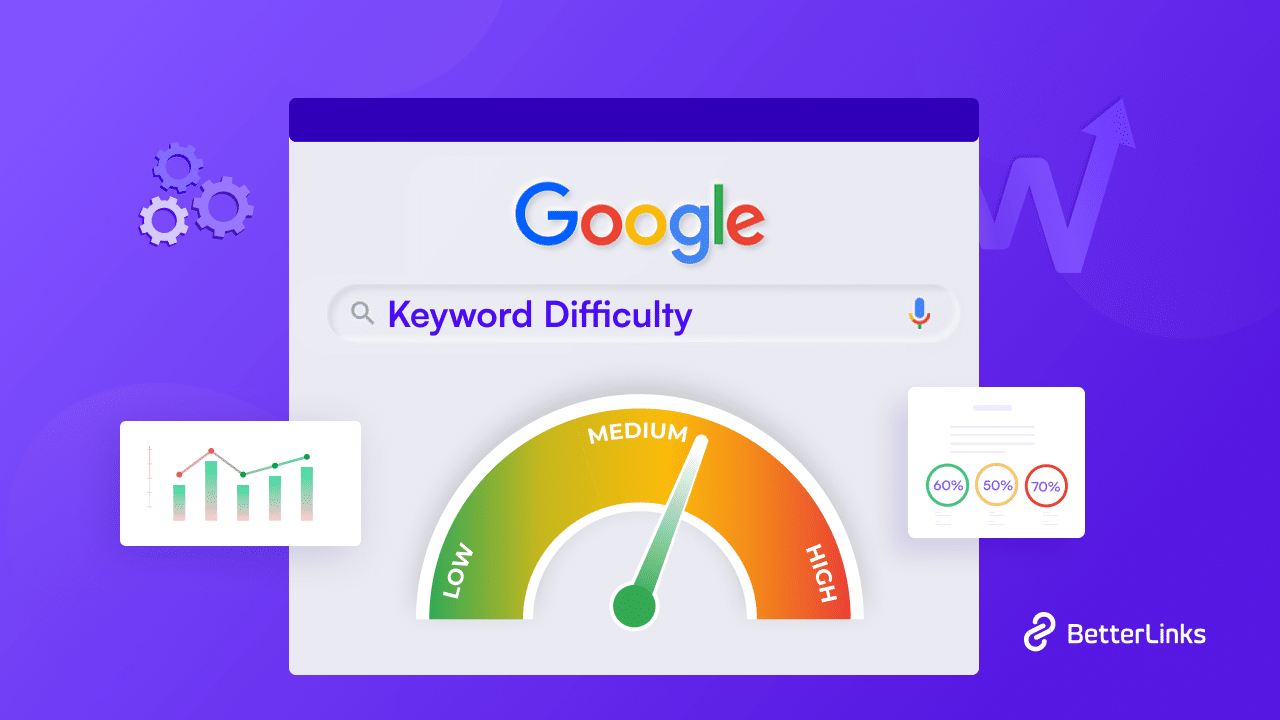In the field of online marketing and search engine optimization (SEO), keywords are the cornerstone of success. These terms and phrases are entered into search engines by people looking for relevant products or services, and when used properly, can help your products or web pages appear at the top of SERPs. This is why choosing the right keywords is essential for optimizing anyone’s organic website traffic. However, not all keywords are created equal. Since some keywords are more competitive than others, it is important that you understand the concept of keyword difficulty identified there.

Define Keyword Difficulty And Its Importance
Keyword difficulty is a metric that helps SEO professionals and marketers assess how hard it is to rank for a particular keyword in search engine results. In this comprehensive guide, you will get into the intricacies of keyword difficulty, its importance, and various methods to measure it effectively.
The keyword difficulty, also commonly abbreviated as KD, is a numerical indicator of how challenging it is or will be to rank effectively for a given term or phrase. This statistic takes into account some variables, such as the level of competition (other websites or web pages that have used the term to rank too), the quality of the content previously published, and the authority of the websites that have already ranked for the said phrase.

Now, let’s discuss why understanding keyword difficulty is essential for several reasons:
💥 Efficient Resource Allocation
You can manage your resources effectively if you are aware of a keyword’s difficulty. It might not be possible for smaller businesses with limited resources to target extremely competitive keywords. Your ability to identify more realistic goals is strengthened by your knowledge of keyword difficulty.
💥 Reach Higher ROI
Your chances of ranking high rise when you concentrate on keywords that are ranked in difficulty. As a result, there can be an increase in organic traffic and an improved return on investment (ROI).
💥 Specific Content Strategy
Your content approach or strategy is determined by keyword difficulty. You can prioritize keywords that are consistent with your objectives and available resources, which will help you create content that ranks high on SERPs more successfully.
💥 Better Competitor Analysis
Knowing the keyword difficulty in your niche enables you to evaluate the tactics of your rivals and identify places where you can exceed them.
What Are The Factors Influencing Keyword Difficulty?

Source: WordStream
To understand how to measure keyword difficulty, it’s crucial to be aware of the factors that contribute to it. These factors can be broadly categorized into the following:
👉 Number Of Competitors
The level of competition increases when more websites target a given term. Look into the number of websites that are already showing up for your target term and check their domain authorities to plan your content.
👉 Authority Of Competitors
It is more difficult to outrank websites with better domain authority and backlink profiles. Examine the legitimacy of the websites holding the top spots. And evaluate how well your content will be able to engage in competition with them.
👉 Relevance And Quality
High-quality, well-optimized content makes it challenging for new competitors to compete. Examine the content’s depth, applicability, and user engagement of the current material.
👉 Multimedia Content And User Experience
Websites featuring multimedia (videos, photos) and better user interfaces frequently perform better in search results. Sometimes, your images might rank in Google Photos even when your web content does not. When assessing competition, take into account these factors.
👉 The Number Of Backlinks
Backlinks are a reliable sign of the authority of a website. Examine the quantity and nature of the connections pointing to the websites of competitors.
👉 Anchor Text Diversity
A genuine backlink profile is indicated by diverse anchor text profiles. Excessive use of exact match anchor texts may indicate tampering.
What Are The Methods To Measure Keyword Difficulty?
Now that we understand the importance of keyword difficulty and the factors influencing it, let’s explore various methods to measure it effectively:
Analyzing Search Engine Results Pages (SERPs):
This technique involves searching for a target keyword manually on the search engine results pages (SERPs). You can evaluate the amount of competition by looking at the top-ranking pages.
As mentioned earlier, look for indicators of strong competition, such as websites with high domain authority, well-known brands, and content of the highest standard. You can evaluate the market situation for your target term and learn about the kinds of content that work effectively by analyzing the SERPs.
Find Out The Keyword Relevance & Optimize:
Analyze how closely your content adheres to the keyword’s search intent. To increase your chances of ranking, make sure your material is very relevant.
This involves producing material that specifically responds to the user’s inquiry and meets their demands. Relevance plays a vital role in determining your ability to successfully compete for a keyword.
Use Multiple Keyword Research Tools:
If you use multiple advanced keyword research tools, you can then easily combine, compare, and measure your selected Keyword Difficulty results and apply thereby. Check some of the tools you can use to measure Keyword difficulty:
🔥 Moz Keyword Difficulty:

Source: Moz
The Keyword Difficulty tool by Moz assigns a numerical score that assesses a keyword’s competitiveness based on several variables, such as backlinks and domain authority.
The Moz tool is useful for determining keyword difficulty because it takes into account a variety of variables that affect a keyword’s competitiveness. It delivers a plain numerical score, which makes it simpler to contrast various keywords.
🔥 Ahrefs Keyword Difficulty:

Source: Ahrefs
Ahrefs provides keyword difficulty stats that assess keyword competition by taking into consideration the number of referring domains and their authority.
Understanding how backlinks affect a keyword’s difficulty is very helpful when using Ahrefs’ keyword difficulty indicator. When evaluating competition, it considers both the quantity and quality of backlinks.
🔥 SEMrush Keyword Difficulty:

Source: SEMrush
SEMrush offers a keyword competition score, a breakdown of the top-ranking pages and their backlink profiles, and a keyword difficulty score.
The keyword difficulty score provided by SEMrush aids in your comprehension of a keyword’s level of competition. A more thorough study is also possible thanks to the breakdown of top-ranking pages and their backlink profiles.
Compare & Combine Results Using Multiple Tools:
Combining data from several keyword research tools can give a more thorough picture of keyword difficulty by taking into account diverse aspects and viewpoints.
You can cross-verify and validate your keyword difficulty analysis by using multiple tools. When choosing keywords for your SEO strategy, several tools may highlight various aspects of competitiveness. By combining their insights, you may make better choices. It lessens the risk of depending simply on a tool’s evaluation, which might not fully reflect the difficulty of a keyword.
Now It’s Your Turn To Explore!
By implementing these methods and considering their elaborated descriptions, you can better assess keyword difficulty and make strategic choices to improve your website’s search engine rankings.
Hope you find this helpful and feel free to share your thoughts with us by commenting below. If you want to read more exciting content like this, subscribe to our blog page, and join our Facebook community to get along with all WordPress experts.








